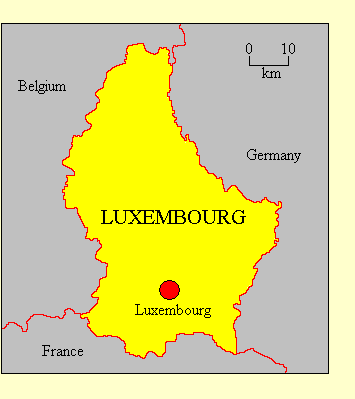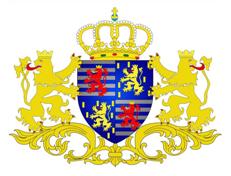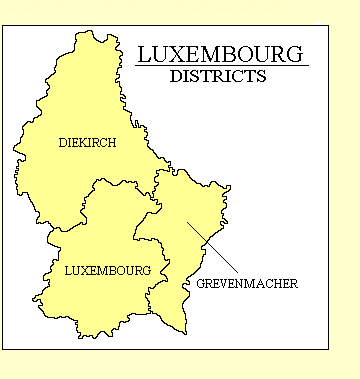

GRAND DUCHY OF LUXEMBOURG
• Official name: Groussherzogtom Letzebuerg / Grand-Duche du Luxembourg / Grossherzogtum Luxemburg (Grand Duchy of Luxembourg)
• Location: Western Europe
• International organisations: Council of Europe, European Union, North Atlantic Treaty
Organisation, Organisation for Economic Co-operation and Development, Organisation Internationale
de la Francophonie, Organisation for Security and Co-operation in Europe, United Nations, Western European Union,
World Trade Organisation
• Borders: Belgium, France, Germany
• Coastline: None
• Land area: 2,586 Km2
• Population: 500,000
• Annual GDP (PPP) per capita: US$78,000 (2009 CIA estimate). World ranking: 3. On this ranking Luxemboug is the third-wealthiest
country in the world. On the standard per capita GDP ranking it is the wealthiest.
• Ethnicity: Most of the population identifies as Luxembourgish, and are of mixed French and German descent. There
are minorities of other European nationalities.
• Languages: Luxembourgish, a dialect of German, is the official language. French and German are used for administation, and
in business and the media. English is widely understood.

• Religion: Over 85% of Luxemburgers are at least nominal Catholic Christians.
• Form of government: Constitutional monarchy and parliamentary democracy. Luxembourg is divided into three regions.
• Capital: Luxembourg
• Constitution: The Constitution of Luxembourgcame into effect
on 17 October 1868.
• Head of state: Grand Duke Henri
assumed the throne on 7 October 2000.
• Head of government: The Prime Minister, appointed by the Grand Duke. The Prime
Minister is the leader of the majority coalition in the legislature, and is accountable to it.
• Legislature: Luxembourg has a unicameral legislature, the
Chamber of Deputies (Chamber vun Deputeirten / Chambre des Deputes). The Chamber has 60
members, elected for
five-year terms by proportional representation from multi-member constituencies.
• Electoral authority:
• Freedom House 2011 rating: Political Rights 1, Civil Liberties 1
• Transparency International Corruption Index: 85% (11 of 178 countries rated)
• Reporters Without Borders Press Freedom 2010 Index: 96% (14 of 178 countries rated)
• Heritage Foundation Economic Freedom 2010 Index: 76.2% (13 of 178 countries rated)
Political history
The Duchy of Luxembourg was created within the Holy Roman Empire in 1354, and passed along with the rest of the
Netherlands to the Hapsburgs in 1482. It was annexed by France in 1684, but returned to the Hapsburgs by the Treaty of
Ryswick in 1697 as part of the Austrian Netherlands.

After the French revolution Luxembourg was again conquered by
France, but under the settlement of 1815 it became a Grand Duchy, with the King of the Netherlands as Grand Duke. When
Belgium rebelled against Dutch rule in 1830 Luxembourg was retained by the Netherlands, but by the Treaty of London
in 1839 it more than half of its territory to Belgium. A constitution was granted in 1868.
In 1890, when Queen Wilhelmina inherited the Dutch throne,
the operation of Salic Law in Luxembourg meant that she could not hold the title of Grand Duke of Luxembourg, and as
a result the Grand Duchy became fully independent, with a treaty guaranteeing its neutrality. Germany violated the
treaty by occupying Luxembourg in 1914, and again in 1940, when it was annexed by Nazi Germany. Liberated in 1945,
Luxembourg abandoned its neutral status and joined NATO in 1948 and European Communities (now the European Union) on its formation in 1957.
Luxembourg is now on some measures the wealthiest country in the world, and is also one of the most politically
stable and conservative. Its politics are dominated by the
mildly conservative
Christian Social People's Party (CSVP), which has been in power for the whole postwar period except for the
period 1974-79. The other major parties are the social-democratic Luxembourg Socialist
Workers' Party (LSAP)
and the liberal Democratic Party (DP), which is usually in coalition with the CSVP. The
CSVP leader Jean-Claude Juncker has been Prime Minister
since 20 January 1995: his government was comfortably re-elected at the 2009 elections.
Updated November 2011
|


